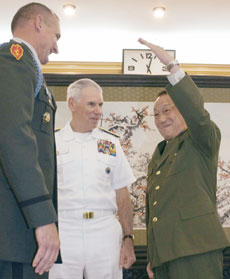Beijing strongly resents, and firmly disagrees with, the latest Pentagon
report that claims China is rapidly extending its military reach and potentially
poses a threat to other countries in the region.
The report, which exaggerates China's military strength and expenditure out
of ulterior motives, is based on "Cold-War mentality," Foreign Ministry
spokesman Liu Jianchao said yesterday.

Chinese Defence
Minister General Cao Gangchuan (R) measures an unidentified US military
officer as the commander of U.S. Pacific Command Admiral William Fallon
(C) looks on during a meeting in the Chinese Ministry of Defence in
Beijing May 10, 2006. [Reuters] |
By spreading the "China threat" theory, the report has seriously violated
principles governing international relations and intervened in China's internal
affairs, he said.
He noted that China is a peace-loving country and adopts a national defence
policy of a defensive nature.
"It is universally recognized that China is an important force in promoting
peace in the Asia Pacific and the world at large," Liu said.
He said Taiwan is an inalienable part of China and urged the US side to stop
selling weapons to the island or sending wrong signals to Taiwan secessionist
forces.
The pace and scope of China's progress in modernizing its military suggests
it is looking beyond Taiwan, the report claimed.
But it also says the pressing focus of the People's Liberation Army is still
Taiwan.
According to the Pentagon, the Chinese mainland has increased by about 25,000
the number of ground forces deployed to the regions opposite Taiwan, and has
upgraded the units with tanks, armoured personnel carriers and artillery.
The report is based on subjective assumptions and exaggeration, Chinese
experts said yesterday.
"It could have a very negative impact on US government policies towards
China," said Ruan Zongze, a senior researcher with the China Institute of
International Studies.
He said the reliability of the report's figures is in doubt as they fail to
make a correct estimate of China's military power.
The figures are based mostly on material collected by US research
institutions rather than Chinese official documents, despite the fact that the
Chinese Government has made great progress in military transparency, he said.
"The theory of a China military threat is totally fictitious," said Zhang
Yijun, a former diplomat in charge of North American affairs.
Government statistics show that China's expenditure on national defence
totalled 244.6 billion yuan (US$30.5 billion) last year, about 7 per cent of the
US defence budget. The US' military expenditure per capita is 60 times that of
China's.
Compared with the massive military expenditure of the United States, China's
spending is "quite small," Zhang said.
The Taiwan question is China's internal affair and the Chinese Government has
always been striving for a peaceful reunification, he noted.
The purpose of conjuring up the "mainland threat" is to press the Taiwan
authorities to buy more weapons from the United States, said Ruan.
The best way to dispel US misunderstandings about China's military strength
is to enhance communication between the military departments of the two
countries, Ruan suggested.